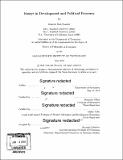| dc.contributor.advisor | Benjamin Olken and Esther Duflo. | en_US |
| dc.contributor.author | Shaukat, Mahvish Ifrah. | en_US |
| dc.contributor.other | Massachusetts Institute of Technology. Department of Economics. | en_US |
| dc.date.accessioned | 2019-09-16T20:58:08Z | |
| dc.date.available | 2019-09-16T20:58:08Z | |
| dc.date.copyright | 2019 | en_US |
| dc.date.issued | 2019 | en_US |
| dc.identifier.uri | https://hdl.handle.net/1721.1/122108 | |
| dc.description | Thesis: Ph. D., Massachusetts Institute of Technology, Department of Economics, 2019 | en_US |
| dc.description | Cataloged from PDF version of thesis. | en_US |
| dc.description | Includes bibliographical references. | en_US |
| dc.description.abstract | This thesis studies three questions in economic development and political economy. Chapter 1 presents empirical evidence on the causal effect of close elections on political selection and performance in India. An extensive literature in political economy predicts electoral competition improves governance. Empirical work testing this theory is scarce, however, due in large part to the difficulty in identifying the causal impact of competition, which is itself an equilibrium outcome shaped by politician behavior. To address this identification challenge, this paper proposes a shift-share instrument that uses variation in aggregate party popularity over time ("shifts") and local party preferences across space ("initial shares") to predict the vote-margin gap in local elections. | en_US |
| dc.description.abstract | Using data on Indian state constituency elections, I find political parties respond strategically to competition by selecting high quality (high valence) candidates to run for office, where quality is proxied by lower criminality, higher education, and higher wealth. Once in office, however, these politicians perform no better in facilitating economic growth or providing public goods. Instead, I find parties make temporary, and likely inefficient, reallocations in state-run resources such as electricity in the run up to competitive elections. Together, the results suggest that while the anticipation of close elections may lead politicians to take costly actions prior to an election, electoral competition does not necessarily result in improved economic outcomes. Chapter 2 studies how the spatial allocation of public goods within cities depends on politicians and bureaucrats. | en_US |
| dc.description.abstract | In many cities around the world, the bureaucrats and politicians that comprise local governments manage non-overlapping administrative and political units. Using geo-referenced data on public goods, property characteristics, and residents in two major cities in Pakistan, I use a spatial regression discontinuity design to estimate discontinuities in public goods provision and property values across these boundaries. These discontinuities are used to construct measures of political and administrative unit "value-added," and to quantify the variation across each type of unit. I find that the delimitation of political and administrative boundaries results in large variation in public goods quality and self-reported property valuations within cities. Political unit quality is correlated with a number of politician and constituency observables, suggesting that political factors may be important determinants of internal city structure. Chapter 3, coauthored with Adnan Q. | en_US |
| dc.description.abstract | Khan, Asim Khwaja, and Benjamin Olken, investigates whether strengthening the link between local taxation and urban services can revitalize the social compact between citizen and state. A significant challenge to the provision of local public services in developing economies is the inability to raise adequate resources, especially through local taxation. In many countries, the social compact, whereby citizens agree to pay taxes to fund their desired services, is broken. A low willingness to pay taxes leads to low revenue collection, and prevents adequate service provision, which in turn reduces willingness to pay and can even lead to citizen disengagement from the state. We investigate whether strengthening the link between local collections and urban services can increase citizen's willingness to pay for services, improve service delivery, and enhance local politics. | en_US |
| dc.description.abstract | We test this in major urban centers in Punjab, Pakistan via several interventions - including eliciting citizen preferences for specific services when taxes are collected, earmarking revenue for specific services, and enabling local politicians - that credibly strengthen the link between tax collection and urban service provision. This paper presents the experimental design and reports first year impacts on tax payments. We find strengthening the link between taxes and services increases tax payments: taxpayers who failed to make a full payment prior to the interventions increase property tax payments after the interventions are introduced. | en_US |
| dc.description.statementofresponsibility | by Mahvish Ifrah Shaukat. | en_US |
| dc.format.extent | 165 pages | en_US |
| dc.language.iso | eng | en_US |
| dc.publisher | Massachusetts Institute of Technology | en_US |
| dc.rights | MIT theses are protected by copyright. They may be viewed, downloaded, or printed from this source but further reproduction or distribution in any format is prohibited without written permission. | en_US |
| dc.rights.uri | http://dspace.mit.edu/handle/1721.1/7582 | en_US |
| dc.subject | Economics. | en_US |
| dc.title | Essays in development and political economy | en_US |
| dc.type | Thesis | en_US |
| dc.description.degree | Ph. D. | en_US |
| dc.contributor.department | Massachusetts Institute of Technology. Department of Economics | en_US |
| dc.identifier.oclc | 1119389146 | en_US |
| dc.description.collection | Ph.D. Massachusetts Institute of Technology, Department of Economics | en_US |
| dspace.imported | 2019-09-16T20:58:06Z | en_US |
| mit.thesis.degree | Doctoral | en_US |
| mit.thesis.department | Econ | en_US |
